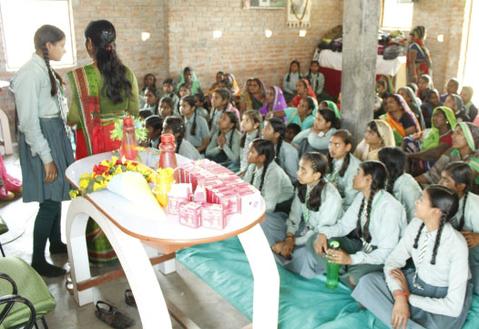|
Samagra Shishu Shikshana (Comprehensive Child Education)
Child is the father of man: “Catch them young, lead them on the ‘right path’” is our motto. Volunteer activities to give importance to comprehensive child education have been a determined effort on our part. Child Education should not merely mean teaching the child the three ‘R’s. It should, on the other hand, mean the child acquiring knowledge from its own participatory activities, directed by its own desires and interests. Experts on child education have always been insisting that learning should be joyous to the child and not a burden. The present approach to child education is based on a wrong assumption that it is preparatory to the formal schooling, unnecessarily compelling the child to read and write, and thereby impeding the development of the child’s personality. There are scientific and systematic approaches available to child education such as – Kindergarten, Montessori, Shishu Vatica and Anganavadi systems. They vary in concept and approach. A detailed study on these methods and discussions with experts on several aspects of child development resulted in evolving a new scheme of “Comprehensive Child Education”, which was put into practice in 1992. Since then, we have been organizing training programmes for teachers, members of the school management committees of Shishu Mandirs(nursery schools), and even elderly women in various places who are eager to benefit from this new approach in their institutions. The subjects covered in these training programmes are invaluable and varied. The training is based on the new approach to child education-identifying the strengths, limitations and needs of every child, prioritizing its physical and mental growth. The training emphasizes the need to the creation of a supportive environment for children in Shishu Mandirs and in their homes. The training is holistic and development oriented. Development of language and mathematical abilities of the children; enabling the children for growth of their social awareness and moral values by proper “Samskaras”; identifying physical and mental handicap of children; attending to overcome such deficiencies of the child; providing first-aid and emergency care in Shishu Mandirs – are a few important aspects on which the training is based. These teacher-trainees are also trained in composing rhymes and small poems; using body language to communicate ideas; narrating stories skilfully; developing their skill in drawing, painting, crafts etc. This new scheme was adopted on an experimental basis in 13 Shishu Mandirs in 8 districts of Karnataka in 1993. In due course, in Tekkatte, Araga, Holehonnur and Kalladka villages people came forward to provide octagonal shaped buildings and fully equipped playgrounds for children. This attracted the parents and management of Shishu Mandirs in other places resulting in those centres also getting necessary learning materials and playgrounds. Till 2001, 272 persons from 24 districts of Karnataka were trainedthrough the annual training programmes. Teachers and experts involved in this experiment meet at regular intervals to discuss problems arising out of the exercise and evolve solutions. Periodical meetings of management committees take stock of the situation. The annual Action Plan of the Shishumandirs includes visits to various experimental centres. Newly wed couples in the area are invited to Shishumandirs during annual day functions, to make them aware of the experiments going on. The quarterly magazine, “AraluvaMoggu” (Blossoming Bud), has gained popularity among parents and teachers, because of its invaluable contents. An audio cassette containing rhymes written by teachers and sung by Smt.B.R.Chaya, has been brought out and sold. This added to the learning materials at Shishu Mandirs. |
There are definite signs of these experiments paying good dividends in terms of child development. |
Aims of Child education
Routine and occasional activities to achieve these aims
| Specialities of Comprehensive Child Education
Supportive activities to promote CHILD education
|

 Child Education
Child Education